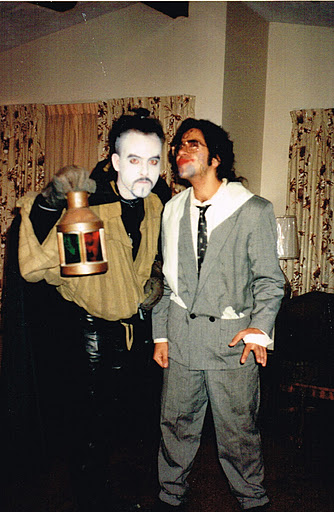I’m doing the “Walk All Night Against Suicide Walk” in June to raise funds for suicide prevention programs. If you wish to donate, go here.
Eighteen years ago my best friend killed himself.
I knew he was badly depressed. I even had a feeling he harbored suicidal thoughts. I just never thought he’d do it.
I was wrapped up in my own world as he deteriorated. I was binge eating and working 80 hours a week, too worried about my career to see much else around me. Had I not been, I might have been able to make a difference. That’s what I believed for years after, at least.
Mood music:
On November 15, 1996, Sean Marley decided he’d had enough.
It was a sparkling, autumn Friday and I was having a great morning at work. But early that afternoon, I got a call at work from my mother. She had driven by Sean’s house and saw police cars and ambulances and all kinds of commotion on the front lawn. I called his sister and she put his wife on the phone. She told me he was dead.
I hated him for years after that, failing to comprehend why he would leave us that way, especially since he knew suicide meant a damned soul. That’s what we were taught. I thought he was a selfish fuck who took the easy way out.
I was especially angry because after my older brother died in 1984, Sean had become another older brother.
It took more than a decade before I was able to make peace with my friend and what he did.
I suffered through my own bouts of depression and started getting therapy. During therapy, I began to understand some important things about myself and about my friend.
Depression robbed me of the ability to see straight. Bad thoughts felt like reality, even though I knew better. Even now, 18 years later, that still happens. I’m going through a bout of depression right now, and I feel alone, unappreciated, and worthless. The reality is precisely the opposite. I have many blessings and a lot of people love me and need me around. And still, when the depression is at it’s worst, I feel like a zero.
That’s something people who don’t suffer from mental illness fail to understand. A cold blanket covers the mind and starts to suffocate it. In the process, you lose the ability to see the real around you and start to see the fake as truth.
That’s what my friend experienced. I get it now.
Why am I still here and he’s not?
Because he never got the chance to put depression into the right perspective and learn the tools to get beyond it. I did.
He also lived in a time when depression was stigmatized, misunderstood and not really talked about. Today, the fight is much more in the open.
I wish he could have lived to see that and benefit from it. But I’m mostly grateful that I’ve been able to benefit from it. I’ve learned a lot about depression and suicide, and I have the tools to get through it.
In a sick way, I think I was required to lose someone to suicide to help push me to where I am right now.
 Sean Marley and me, Halloween 1990.
Sean Marley and me, Halloween 1990.
